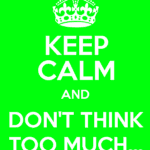In a recent TED talk Suzana Herculano-Houzel, a Brazilian neuroscientist, discussed the development of human brains and how they differ from the brains of other species. As part of her explanation, she mentions that the human brain uses approximately one-fourth of the total energy humans consume. That is, for a 2,000-calorie diet, 500 of those calories are used for simple brain up-keep and thinking. In addition, after several hours of strenuous thinking, studies show that there is an obvious difference between the amount of glucose that an active versus non-active brain consumes. One could say that the act of thinking is a workout in itself!
This idea relates to the world of sports through the psychological idea of “monkey mind.” In psychology, “monkey mind” refers to a mind that is “unsettled; restless…confused…uncontrollable.” When an athlete over-thinks his or her swing or worries about making a bad shot in the middle of a game, his or her thoughts are no longer in control. He or she experiences a “monkey mind”. As Herculano-Houzel and other scientists tell us, a “monkey mind” consumes more energy than a calm, in-the-moment mind.
 In the end, the extra energy needed to fuel an over-active mind is wasted because in almost all cases over-thinking only hurts an athlete’s performance. A “monkey mind” literally robs the body of fuel- fuel that it could be using to perform. Fortunately, “monkey mind” is completely preventable. With daily practice in mindfulness techniques, such as meditation, body scans, and yoga, an athlete can train his or her mind to be more focused and calm during competition, consume less energy, and free this energy for the body to use. Mindfulness techniques not only helps an athlete to refocus, but also optimizes his or her energy usage on a scientific level.
In the end, the extra energy needed to fuel an over-active mind is wasted because in almost all cases over-thinking only hurts an athlete’s performance. A “monkey mind” literally robs the body of fuel- fuel that it could be using to perform. Fortunately, “monkey mind” is completely preventable. With daily practice in mindfulness techniques, such as meditation, body scans, and yoga, an athlete can train his or her mind to be more focused and calm during competition, consume less energy, and free this energy for the body to use. Mindfulness techniques not only helps an athlete to refocus, but also optimizes his or her energy usage on a scientific level.
*This post may contain affiliate links. As an Amazon Associate we earn from qualifying purchases.

